2-CHLORO-6-METHOXYPHENYLBORONIC ACID
- CAS NO.:385370-80-9
- Empirical Formula: C7H8BClO3
- Molecular Weight: 186.4
- MDL number: MFCD04039878
- SAFETY DATA SHEET (SDS)
- Update Date: 2024-01-01 23:31:51
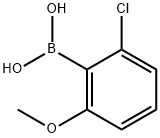
What is 2-CHLORO-6-METHOXYPHENYLBORONIC ACID?
The Uses of 2-CHLORO-6-METHOXYPHENYLBORONIC ACID
2-Chloro-6-methoxyphenylboronic acid can be used as a reactant:
- In the palladium-catalyzed Suzuki-Miyaura coupling reaction.
- To synthesize canthin-6-one alkaloids by reacting with 8-bromo-1,5-naphthyridin-2-one via Pd-catalyzed Suzuki coupling and Cu-catalyzed amidation reactions.
- To prepare tryptamines via Suzuki coupling of vinylsulfonylmethyl resin-bound bromotryptamine.
The Uses of 2-CHLORO-6-METHOXYPHENYLBORONIC ACID
suzuki reaction
Properties of 2-CHLORO-6-METHOXYPHENYLBORONIC ACID
| Melting point: | 162-165 °C (lit.) |
| Boiling point: | 355.5±52.0 °C(Predicted) |
| Density | 1.32±0.1 g/cm3(Predicted) |
| storage temp. | under inert gas (nitrogen or Argon) at 2-8°C |
| form | powder to crystal |
| pka | 8.26±0.58(Predicted) |
| color | White to Almost white |
Safety information for 2-CHLORO-6-METHOXYPHENYLBORONIC ACID
| Signal word | Warning |
| Pictogram(s) |
 Exclamation Mark Irritant GHS07 |
| GHS Hazard Statements |
H315:Skin corrosion/irritation H319:Serious eye damage/eye irritation |
| Precautionary Statement Codes |
P280:Wear protective gloves/protective clothing/eye protection/face protection. P302+P352:IF ON SKIN: wash with plenty of soap and water. P305+P351+P338:IF IN EYES: Rinse cautiously with water for several minutes. Remove contact lenses, if present and easy to do. Continuerinsing. P332+P313:IF SKIN irritation occurs: Get medical advice/attention. P337+P313:IF eye irritation persists: Get medical advice/attention. |
Computed Descriptors for 2-CHLORO-6-METHOXYPHENYLBORONIC ACID
New Products
Tert-butyl bis(2-chloroethyl)carbamate (S)-3-Aminobutanenitrile hydrochloride N-Boc-D-alaninol N-BOC-D/L-ALANINOL N-octanoyl benzotriazole 4-Hydrazinobenzoic acid 3,4-Dibenzyloxybenzaldehyde 1,1’-CARBONYLDIIMIDAZOLE R-2-BENZYLOXY PROPIONIC ACID 1,1’-CARBONYLDI (1,2-4 TRIAZOLE) 4-HYDROXY BENZYL ALCOHOL 3-NITRO-2-METHYL ANILINE (2-Hydroxyphenyl)acetonitrile 4-Bromopyrazole 5-BROMO-2CYANO PYRIDINE 5,6-Dimethoxyindanone 5-broMo-2-chloro-N-cyclopentylpyriMidin-4-aMine 4-methoxy-3,5-dinitropyridine 2-(Cyanocyclohexyl)acetic acid 2-aminopropyl benzoate hydrochloride 1-(4-(aminomethyl)benzyl)urea hydrochloride tert-butyl 4- (ureidomethyl)benzylcarbamate diethyl 2-(2-((tertbutoxycarbonyl)amino) ethyl)malonate Ethyl-2-chloro((4-methoxyphenyl)hydrazono)acetateRelated products of tetrahydrofuran

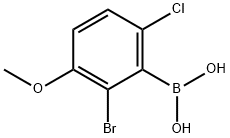
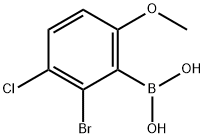
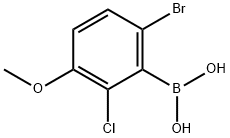
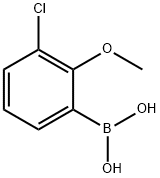
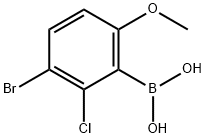
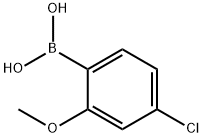
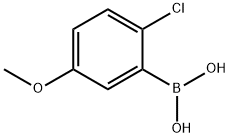
You may like
-
 2-Chloro-6-methoxyphenylboronic Acid (contains varying amounts of Anhydride) CAS 385370-80-9View Details
2-Chloro-6-methoxyphenylboronic Acid (contains varying amounts of Anhydride) CAS 385370-80-9View Details
385370-80-9 -
 55441-95-7 99%View Details
55441-95-7 99%View Details
55441-95-7 -
 N-Vinylformamide 99%View Details
N-Vinylformamide 99%View Details
13162-05-5 -
 Chloro Uracil 1820-81-1 99%View Details
Chloro Uracil 1820-81-1 99%View Details
1820-81-1 -
 207557-35-5 99%View Details
207557-35-5 99%View Details
207557-35-5 -
 2-ethyl-6-methyl-3-hydroxypyridine succinate 99%View Details
2-ethyl-6-methyl-3-hydroxypyridine succinate 99%View Details
127464-43-1 -
 2-ETHYLPYRIDINE 100-71-0 99%View Details
2-ETHYLPYRIDINE 100-71-0 99%View Details
100-71-0 -
 181228-33-1 (S)-Methyl 3-amino-2-((tert-butoxycarbonyl)amino)propanote Hydrochloride (DAP-OMe. HCl) 99%View Details
181228-33-1 (S)-Methyl 3-amino-2-((tert-butoxycarbonyl)amino)propanote Hydrochloride (DAP-OMe. HCl) 99%View Details
181228-33-1
Statement: All products displayed on this website are only used for non medical purposes such as industrial applications or scientific research, and cannot be used for clinical diagnosis or treatment of humans or animals. They are not medicinal or edible.